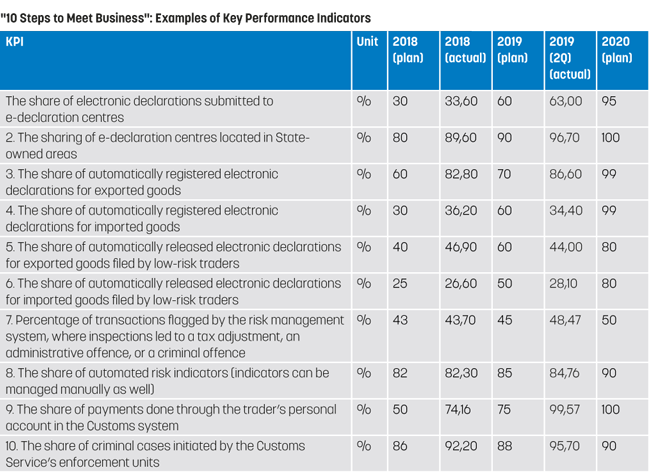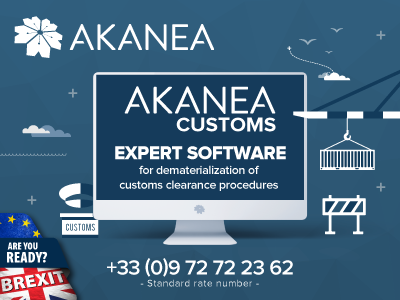Russian businesses commit to creating a better trade environment
22 October 2019
By the Russian Federal Customs ServiceA new tool has been developed in Russia to help create an enabling trade environment: the “Charter on Fair Participation in Foreign Economic Activity.” The Charter is the result of a series of complex consultations between government and business representatives on how the latter can back up government efforts to enhance the trade environment and, in particular, support the Russian Federal Customs Service (FCS) in the implementation of specific measures, known as the “10 Steps to Meet Business.”
Customs Development Programme
The “10 Steps to Meet Business” measures form a specific section of the Customs Development Programme, which provides the roadmap through which the FCS intends to improve operational efficiency, mitigate corruption risks, reduce traders’ administrative burden, and create a level playing field for legitimate businesses.
Implementation of the Customs Development Programme by the FCS has already translated into the establishment of 16 Customs clearance locations, called Electronic Declaration Centres. By January 2020, only these centres will remain active, while all the old Customs centres will be closed permanently.
Today, traders must submit their declarations electronically to one of the Electronic Declaration Centres, although paper declarations for specific types of clearance (transit, TIR Carnets, passengers’ personal goods, postal items, and means of conveyance) are still accepted at the old Customs centres in some cases.
In addition, infrastructure, including the checkpoints, has been modernized and new sophisticated processes adopted with the integration of databases, the standardization of data and messages, the creation of personal accounts for each of the trading companies, and the setting up of communication channels with all State agencies and traders.
To monitor the implementation of the Customs Development Programme, 41 key performance indicators (KPIs) were identified. Those referring to the section “10 Steps to Meet Business” include the sharing of online submissions of declarations, and the sharing of automatically released electronic declarations (see graph).

Charter on Fair Participation in Foreign Economic Activity
The Charter was drafted by the four biggest business associations in Russia with the strong support of Leonid Lozbenko, Chairman of the FCS Public Council[1], Russian Customs’ consultative body that aims to develop a robust and sustained engagement/partnership mechanism with business, as encouraged by the WCO in its Customs-Business Partnership Guidance.
It sets out simple principles that signatories commit to applying, in order to support the FCS in achieving some of the Customs Development Programme deliverables, such as the ones related to clearance time, and digitalized and automated declaration processing.
Businesses signing the Charter commit to comply with Customs rules and regulations, to provide the FCS with reliable data, and to demonstrate zero tolerance towards companies that commit offences, such as evading the payment of Customs duties and fees.
The Charter is open for signature by national or foreign companies involved in foreign economic activity as well as by business associations, including non-commercial organizations. The process can be done online through a website: www.dobro-ved.ru. So far, 1,780 companies and 173 public associations have signed the Charter, a testimony to the increased level of confidence that the business community has in State activities.
Through the Charter, the FCS will be able to enlarge the pool of traders considered compliant and categorized as low risk in the automated risk management system. Several benefits are available to signatories, including access to an expanded list of electronic services provided by the FCS, one of which is being notified of the level of risk (low, medium or high) that has been assigned to a company within the risk management system. The notification is sent to the personal account created for each signatory by Customs.
As signatories are granted higher levels of trust, clearance of their shipments should be fast. Of course, if a company is found not to be compliant with the law, its risk scoring will change. It will also be known as an offender who misused the State’s trust. The business association and the trade union to which the company belongs will also take specific actions against it. Hence, failing to comply with the provisions of the Charter creates an internal follow-up and investigation.
The Association of European Business was the first foreign entity to sign the Charter on 21 February 2018 in Moscow. As highlighted by its Chief Executive Officer, Frank Schauff, at the time he signed the Charter, the Customs Development Programme and the Charter also aim to reduce corruption by minimizing contact with Customs officers, specifically through the complete digitalization and automatization of the cross-border clearance process.
Pathway to strengthen the Customs-business partnership
The FCS hopes that this way of engaging business entities, through the conclusion of a charter, may be of interest to other countries, one that they may choose to emulate as part of their efforts to strengthen the Customs-business partnership.
More information
info@dobro-ved.ru
www.dobro-ved.ru
[1] Public Councils are advisory bodies attached to ministries or other government agencies. Their main goal is to identify socially significant issues, to discuss them, and to achieve particular results. The FCS Public Council was established in 2015 and consists of 21 representatives from public organizations and business.

